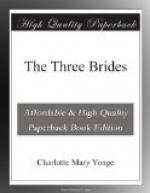Some one asked after Captain Duncombe as she descended into private life. “There’s a wonderful filly that absorbs all his attention. All Wil’sbro’ might burn as long as Dark Hag thrives! When do I expect him? I don’t know; it depends on Dark Hag,” she said in a tone of superior good-natured irony, then gathered up the radiant mantle and tripped off along the central street of the little old-fashioned country town, with gravelled not paved side-walks.
“Isn’t she very superior?” said Cecil, when her husband had put her on horseback.
“I suppose she is very clever.”
“And she spoke capitally.”
“If she were to speak. What would your father think of her?”
But for the first time Cecil’s allegiance had experienced a certain shock. Some sort of pedestal had hitherto been needful to her existence; she was learning that Dunstone was an unrecognized elevation in this new country, and she had seen a woman attain to a pinnacle that almost dazzled her, by sheer resource and good sense.
All the discussion she afterwards heard did not tend to shake her opinion; Raymond recounted the adventure at his mother’s kettle-drum, telling of his own astonishment at the little lady’s assurance.
“I do not see why she should be censured,” said Cecil. “You were all at a loss without her.”
“She should have got her husband to speak for her,” said Mrs. Poynsett.
“He was not there.”
“Then she should have instructed some other gentleman,” said Mrs. Poynsett. “A woman spoils all the effect of her doings by putting herself out of her proper place.”
“Perfectly disgusting!” said Julius.
Cecil had decidedly not been disgusted, except by the present strong language; and not being ready at repartee, she was pleased when Rosamond exclaimed, “Ah! that’s just what men like, to get instructed in private by us poor women, and then gain all the credit for originality.”
“It is the right way,” said the mother. “The woman has much power of working usefully and gaining information, but the one thing that is not required of her is to come forward in public.”
“Very convenient for the man!” laughed Rosamond.
“And scarcely fair,” said Cecil.
“Quite fair,” said Rosamond, turning round, so that Cecil only now perceived that she had been speaking in jest. “Any woman who is worth a sixpence had rather help her husband to shine than shine herself.”
“Besides,” said Mrs. Poynsett, “the delicate edges of true womanhood ought not to be frayed off by exposure in public.”
“Yes,” said Raymond. “The gain of an inferior power of man in public would be far from compensated by the loss in private of that which man can never supply.”
“Granted,” said Rosamond slyly though sleepily, “that it always is an inferior power of man, which it does not seem to have been in the actual case.”




